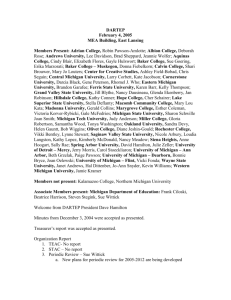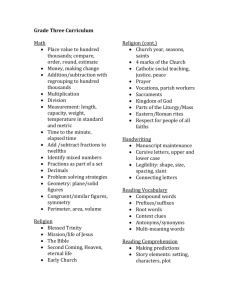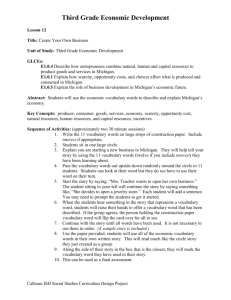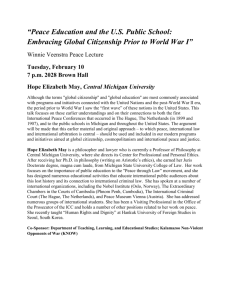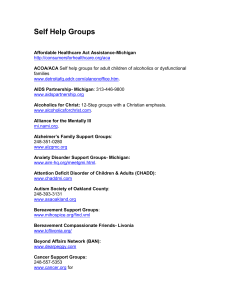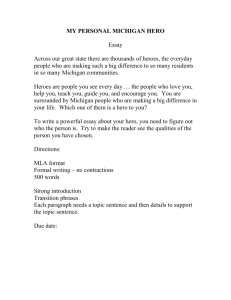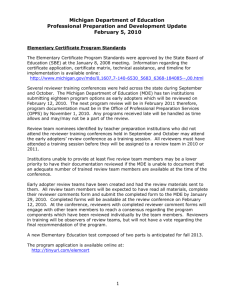DARTEP April 2013x - Directors and Representatives of
advertisement
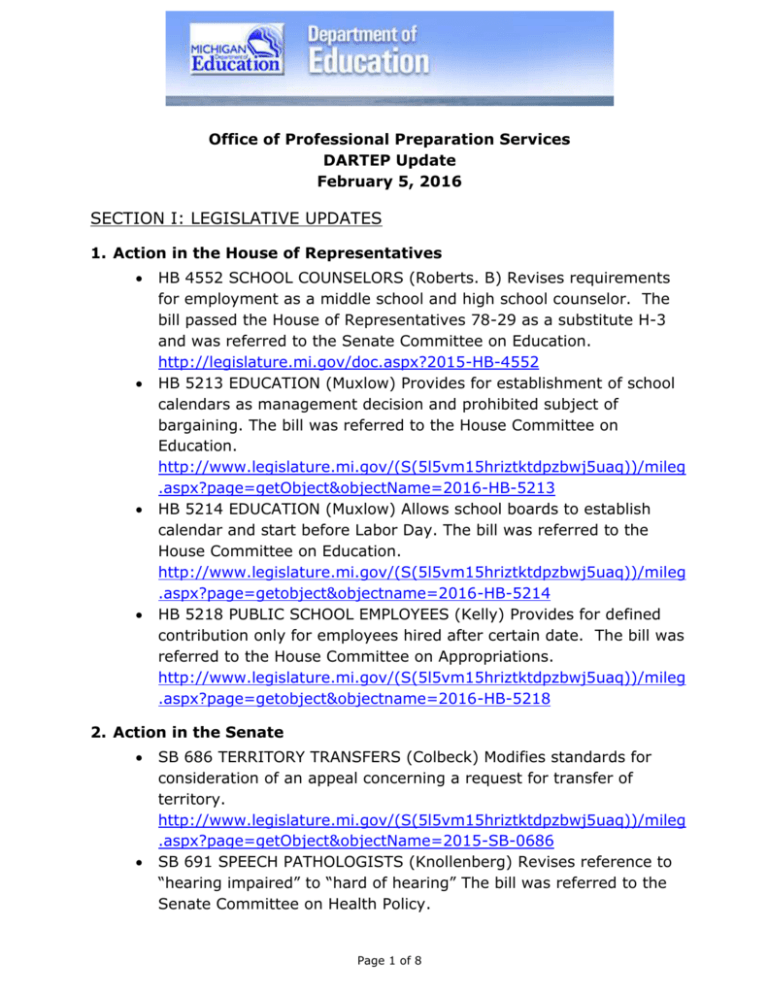
Office of Professional Preparation Services DARTEP Update February 5, 2016 SECTION I: LEGISLATIVE UPDATES 1. Action in the House of Representatives HB 4552 SCHOOL COUNSELORS (Roberts. B) Revises requirements for employment as a middle school and high school counselor. The bill passed the House of Representatives 78-29 as a substitute H-3 and was referred to the Senate Committee on Education. http://legislature.mi.gov/doc.aspx?2015-HB-4552 HB 5213 EDUCATION (Muxlow) Provides for establishment of school calendars as management decision and prohibited subject of bargaining. The bill was referred to the House Committee on Education. http://www.legislature.mi.gov/(S(5l5vm15hriztktdpzbwj5uaq))/mileg .aspx?page=getObject&objectName=2016-HB-5213 HB 5214 EDUCATION (Muxlow) Allows school boards to establish calendar and start before Labor Day. The bill was referred to the House Committee on Education. http://www.legislature.mi.gov/(S(5l5vm15hriztktdpzbwj5uaq))/mileg .aspx?page=getobject&objectname=2016-HB-5214 HB 5218 PUBLIC SCHOOL EMPLOYEES (Kelly) Provides for defined contribution only for employees hired after certain date. The bill was referred to the House Committee on Appropriations. http://www.legislature.mi.gov/(S(5l5vm15hriztktdpzbwj5uaq))/mileg .aspx?page=getobject&objectname=2016-HB-5218 2. Action in the Senate SB 686 TERRITORY TRANSFERS (Colbeck) Modifies standards for consideration of an appeal concerning a request for transfer of territory. http://www.legislature.mi.gov/(S(5l5vm15hriztktdpzbwj5uaq))/mileg .aspx?page=getObject&objectName=2015-SB-0686 SB 691 SPEECH PATHOLOGISTS (Knollenberg) Revises reference to “hearing impaired” to “hard of hearing” The bill was referred to the Senate Committee on Health Policy. Page 1 of 8 http://www.legislature.mi.gov/(S(5l5vm15hriztktdpzbwj5uaq))/mileg .aspx?page=getObject&objectName=2015-SB-0691 SB 692 HEARING IMPAIRED REFERENCES (Zorn) Revises reference to deaf and “hearing impaired” to deaf, deafblind and “hard of hearing.” The bill was referred to the Senate Committee on Health Policy. http://www.legislature.mi.gov/(S(5l5vm15hriztktdpzbwj5uaq))/mileg .aspx?page=getobject&objectname=2015-SB-0692 SB 693 DEAFNESS ACT (O’Brien) Revises title of division on deafness act to division on deaf, deafblind and hard of hearing. The bill was referred to the Senate Committee on Health Policy. http://www.legislature.mi.gov/(S(5l5vm15hriztktdpzbwj5uaq))/mileg .aspx?page=getobject&objectname=2015-SB-0693 SB 694 DEAF, DEAFBLIND AND HEARING IMPAIRED (Warren) Revises reference in the department of civil rights to “deaf, deafblind and hearing impaired” The bill was referred to the Senate Committee on Health Policy. http://www.legislature.mi.gov/(S(5l5vm15hriztktdpzbwj5uaq))/mileg .aspx?page=getobject&objectname=2015-SB-0694 SB 710 DPS REFORM (Hansen) Creates community districts. The bill was referred to the Senate Committee on Government Operations. http://www.legislature.mi.gov/(S(xoqlynzrdrvpfhrnl31tulmp))/mileg. aspx?page=getObject&objectName=2016-SB-0710 SB 711 MICHIGAN FINANCIAL REVIEW COMMISSION (Hansen) Expands Michigan financial review commission to include certain school districts. http://www.legislature.mi.gov/(S(xoqlynzrdrvpfhrnl31tulmp))/mileg. aspx?page=getobject&objectname=2016-SB-0711 SECTION II: MDE UPDATES 1. Top 10 in 10 Years In response to a request for suggestions on how to make Michigan a Top 10 state for education within the next 10 years, the Michigan Department of Education and the State Board of Education (SBE) received input from numerous stakeholder groups, education partners, and citizens. The information was provided via formal presentations to the SBE, written submissions, one-on-one and group Page 2 of 8 meetings with the State Superintendent, and through electronic responses. Attached is the Top 10 in 10 document. SECTION III: OPPS UPDATES 1. Educator Preparation Institution (EPI) Performance Score Updates Reminder! Component and overall score reports for the 2016 EPI Performance Score will be distributed on or before April 5, 2016, with a formal presentation to the State Board of Education on April 12, 2016. The Extranet system on the Michigan Department of Education’s (MDE) Outlook 360 system has been successfully tested. The MDE asks that each EPI submit a designee for secure score and data access to the MDE by Friday, February 19. It is suggested that the designee at the district who normally is the point-of-contact for component and overall score reports be identified as the Extranet user. This person will receive information on how to set up access on the MDE system. Please e-mail Jim Gullen at GullenJ@michigan.gov the name, e-mail address, and phone number of your designee by Friday, February 19, so that a roster can be built. 2. New MOECS Screens for Alternate Scores At the February 5 meeting, an announcement will be made about the availability of new MOECS screens that will accept alternate PRE scores and the -1 SEM adjustment. These screens will be viewable by staff at colleges and universities and will replace the Excel spreadsheet that has been used up until now to record the use of alternate scores and -1 SEM adjustments. A user/technical guide will be distributed by February 12, 2016, to assist in the use of these screens. After that date, the Excel spreadsheet will no longer be used. 3. ResultsAnalyzer Presentation Preparation The April DARTEP agenda will feature a presentation on the use of MTTC data through Evaluation Systems’ ResultsAnalyzer data portal. During the lunchtime portion of the February DARTEP, Phil Chase and Steve Stegink will be available to capture requests and suggestions for the April presentation. Page 3 of 8 4. MTTC performance reports The MTTC annual reports for 2014-2015 and 2012-2015 have been sent to EPI Deans and Directors contact list and certification officers. The 2014-2015 reports were sent on January 29, 2016. The 20122015 reports were sent on February 2, 2016. Contact Dana Utterback with questions you may have: UtterbackD@michigan.gov. 5. Use of the new ACT Writing Score as Alternate Score for PRE Writing Michigan EPIs May: Use ACT Inc.-produced concordant table to convert current/new ACT writing scores to previous/former ACT writing scores: http://www.act.org/aap/pdf/ACTWritingConcordance.pdf. Use Table 4 at the end of the ACT publication for concordant values. Derive Former ACT writing score from concordant Current ACT writing score, or, in some cases, from a current ACT writing score range. Use derived Former ACT writing score with any ACT English score from 1989 to the present to derive Combined English/Writing score using ACT provided matrix: http://www.actstudent.org/writing/combined.html. o The warning in the matrix introduction, “For tests taken prior to September 2015”, applies to purposes related to ACT Inc.generated Student Reports. o The warning does not apply to using the matrix for deriving ACT Combined English/Writing scores for purposes related to Michigan Test for Teacher Certification Professional (MTTC) Readiness Examination (PRE) alternative pass measures. Additional Notes: ACT Combined English/Writing score > 24 continue to be required for use as MTTC PRE writing alternative pass measure. A single Former ACT Writing Score might concord with a range of Current ACT Writing Scores, for example: o Current ACT Writing Score range of 23 through 29 concords with Former ACT Writing Score of 8 o Current ACT Writing Score range of 19 through 22 concords with Former ACT Writing Score of 7 Page 4 of 8 Current ACT Writing Scores of 30 or 31 concord with Former ACT Writing Score of 9 ACT Combined English/Writing score of 24 may be achieved through various combinations of an ACT English score with concordant ACT Writing scores, for example: o an ACT English score of 25 with concordant current/new ACT Writing scores of 23, 24, 25, 26, 27, 28, or 29 generate an ACT Combined English/Writing score of 24, because the score range of 23 through 29 concords with former ACT writing score of 8. o an ACT English score of 24 with concordant current/new ACT Writing scores of 30 or 31 generate an ACT Combined English/Writing score of 24, because either 30 or 31 concord with former ACT writing score of 9 Please contact Steve Stegink, 517-241-4945, or SteginkS@michigan.gov, with questions. o 6. MTTC Enhancement for Individuals for Whom English is not a Primary Language Beginning with the 2015-2016 MTTC test administration period, the MTTC program now provides an alternative test arrangement for test takers for whom English is not a primary language. The details are provided, among other alternative arrangements, online: http://www.mttc.nesinc.com/MI17_altarrangements.asp An MTTC non-world language test will continued to be provided in English. However, additional time to complete a non-world language MTTC test will be provided. Thank you for promoting this enhancement with MTTC test takers who may be eligible for such an alternative arrangement. 7. World Language Teacher Preparation Program Review and Assessments The OPPS has developed a streamlined process for review and approval of existing world language teacher preparation programs, and will host a live webinar in the spring (April or May, date to be announced) to provide technical assistance on the program application. Deans and Directors are asked to participate along with World Language faculty who will be preparing the application. For the convenience of those unable to attend the webinar live, video will be Page 5 of 8 posted online for later viewing. In addition to technical assistance with the program application, information regarding candidate registration for the Oral Proficiency Interview (OPI), a required assessment under the new standards, will be disseminated during the webinar. These new registration procedures will ensure that candidate performance on the OPI is directly reported to the OPPS, in a similar manner as MTTC results. SECTION IV: OPPS REMINDERS 1. Changes to the Certification Officer and Administrator Program Listings on the OPPS website Approved administrator programs and contact information for certification officers are now included in the MOECS/ProPrep database (https://mdoe.state.mi.us/moecs/PublicProPrep.aspx). Separate listings are no longer available on the website. All corrections/updates for certification officers listed on the MOECS/ProPrep database should be sent to Katie Schmiedeknecht at SchmiedeknechtK@michigan.gov. The administrator program list is updated when such programs are approved. 2. Accreditation Facebook Group for “CAEP Accreditation in Michigan”: This Facebook group “CAEP Accreditation in Michigan” is designed as a forum to share innovations and ideas related to CAEP Accreditation for Michigan educator preparation programs. This group is also designed as a space to ask questions and get advice from colleagues working through the accreditation process as well as the opportunity to tap into the knowledge and experience of colleagues who gone through CAEP accreditation. Please search Facebook groups for “CAEP Accreditation in Michigan” or contact Dr. Catherine Wigent at WigentC@Michigan.gov. 3. Diagnosis and Remediation of Reading Courses: The MDE no longer accepts letters from EPIs substituting or waiving course work for individual students. For inquires related to special circumstances, please contact Dr. Sean Kottke at KottkeS@michigan.gov. 4. CPR/First Aid According to the revised school code (380.1531d), candidates recommended for initial teaching certificates must hold a valid certification Page 6 of 8 in the areas of first aid and cardiopulmonary resuscitation. Please see the following link for information on the legislative requirements and the list of MDE approved providers: http://www.michigan.gov/mde/0,4615,7-1405683_14795-75289--,00.html. Additionally, please ensure all candidates recommended for initial teaching licensure to the MDE hold valid certification cards at the time of application and subsequent recommendation for certification. 5. MDE/EPI Distribution Lists If you have staff changes within your Education Office, including certification officers, please contact Katie Schmiedeknecht at SchmiedeknechtK@Michigan.gov to update our distribution lists accordingly. 6. Certification Change Requests EPI Certification Officers must submit certification change requests to Kathy Curtis at CurtisK2@michigan.gov. 7. Title II annual reporting For questions about annual reporting, please contact Jim Gullen at 517373-1925 or GullenJ@michigan.gov. 8. DARTEP Listserv If you wish to have someone added or removed please contact Rueben. SECTION V: INTERESTING LITERATURE SHARED WITH OPPS Ding, C., & Sherman, H. (2006). Teaching effectiveness and student achievement: Examining the relationship. Educational Research Quarterly, 29(4), 40–51. Retrieved from http://files.eric.ed.gov/fulltext/EJ781882.pdf Dodson, M., Kottke, S., Lents, A., and McPhee, P. (2015). Starting with Why in Teacher Preparation: Community.” Language Arts, 93(2), 113-116. Glazerman, S., Isenberg, E., Dolfin, S., Bleeker, M., Johnson, A., Grider, M., & Jacobus, M. (2010). Impacts of comprehensive teacher induction: Final results from a randomized controlled study (NCEE 2010-4027). Washington, DC: National Center for Education Evaluation and Regional Assistance, Institute of Education Sciences, U.S. Department of Education. Page 7 of 8 Henry, G. T., Campbell, S. L., Thompson, C. L., Patriarca, L. A., Luterbach, K. J., Lys, D. B., & Covington, V. M. (2013). The predictive validity of measures of teacher candidate programs and performance: Toward an evidence-based approach to teacher preparation. Journal of Teacher Education, 64(5), 439–453. Meyer, S. J., Brodersen, R. M., & Linick, M. A. (2014). Approaches to evaluating teacher preparation programs in seven states (REL 2015-044). Washington, DC: U.S. Department of Education, Institute of Education Sciences, National Center for Education Evaluation and Regional Assistance, Regional Educational Laboratory Central. Retrieved from http://ies.ed.gov/ncee/edlabs/regions/central/pdf/REL_2015044.pdf Noell, G. H., Brownell, M. T, Buzick, H. M., & Jones, N. D. (2014). Using educator effectiveness measures to improve educator preparation programs and student outcomes (Document No. LS-1). Retrieved from University of Florida, Collaboration for Effective Educator, Development, Accountability, and Reform Center website: http://ceedar.education.ufl.edu/wp-content/uploads/2014/09/LS1_FINAL_08-27-14.pdf Page 8 of 8
